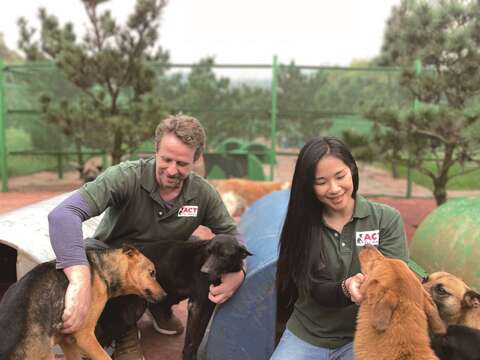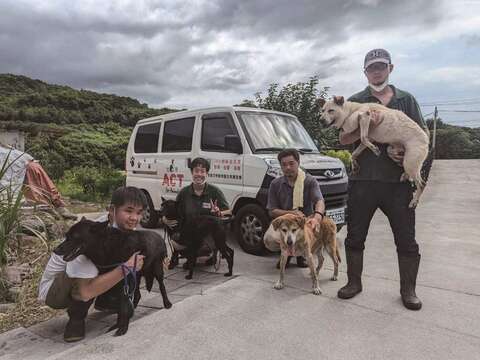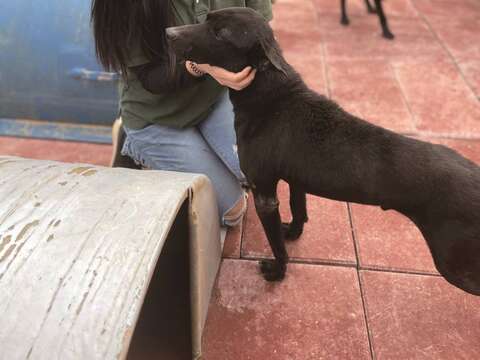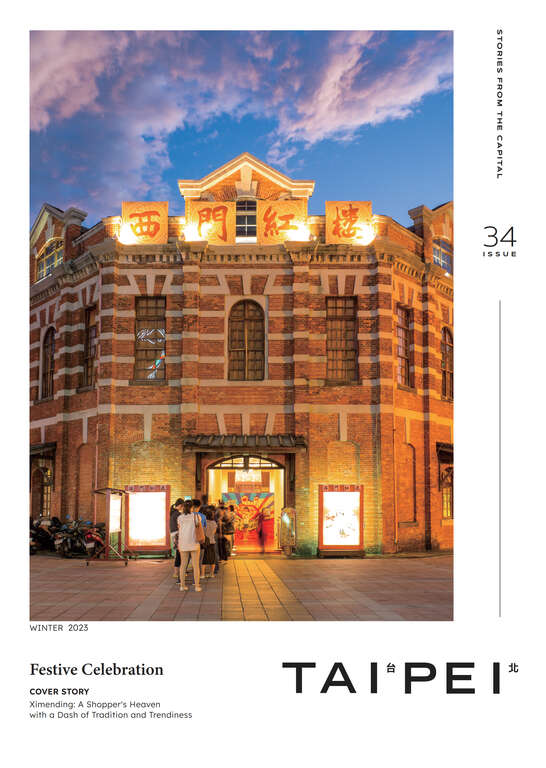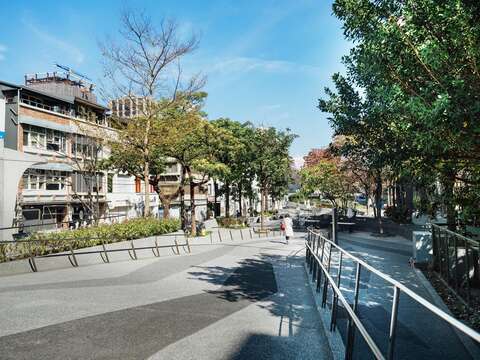Post date:2023-12-11
332
TAIPEI #34 (2023 Winter)
ACT for Animals Sets New Standards for Animal Rehabilitation
Author Rick Charette
Photographer ACT for Animals
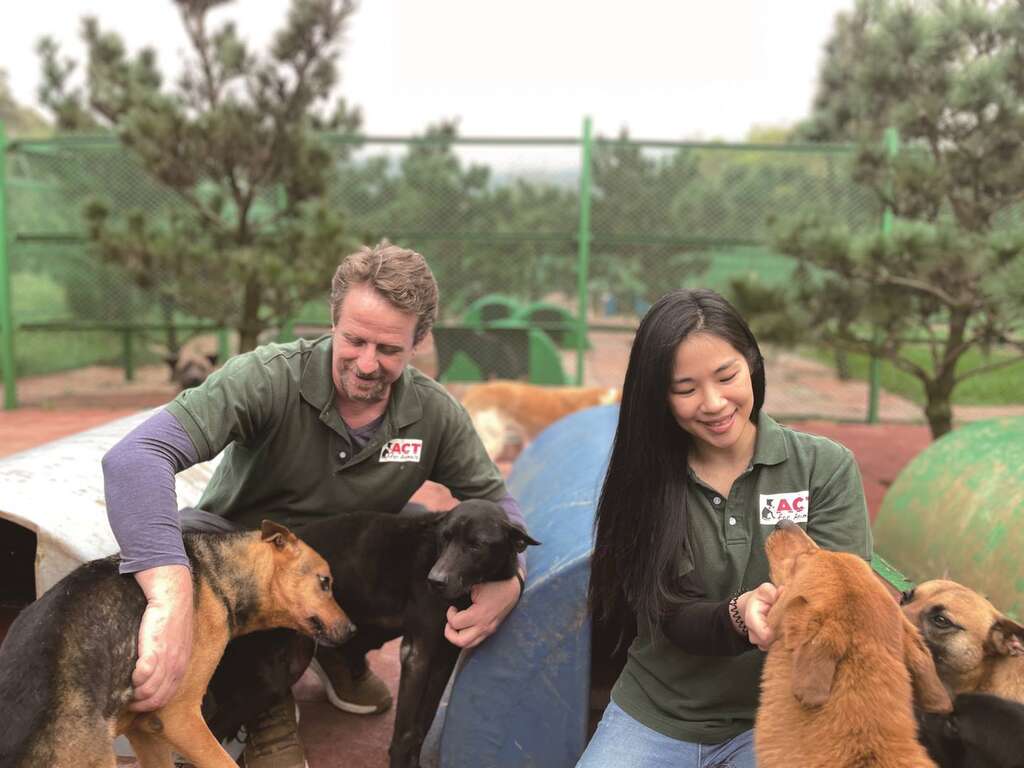 ▲ACT for Animals founder Judy Hsu and co-founder Sean McCormack have long been dedicated to helping stray animals in Taiwan.
▲ACT for Animals founder Judy Hsu and co-founder Sean McCormack have long been dedicated to helping stray animals in Taiwan.
Stray animals are an ongoing concern in Taiwan. Over the past few decades, pets have become beloved in Taiwanese society, with a surge in adoptions during the COVID-19 pandemic. Unfortunately, this has led to an increase in abandonments, necessitating more rehabilitation efforts.
In 2017 a ban on euthanizing impounded animals took effect in Taiwan. As a result, pressure has steadily increased on resource-strapped public animal shelters, and numerous organizations have stepped in to help in rescue efforts. Among the most prominent names is ACT for Animals (台灣愛克特動物重生救援協會), founded in 2019 by a cross-culture couple, Judy Hsu (Taiwan) and Sean McCormack (UK). ACT stands for"Animal Care Trust." TAIPEI sat down with Hsu, the Executive Director, to learn more about the NGO's rescue activities, the homeless animal situation in Taipei/Taiwan, how animal care practices in Taipei differ from other places worldwide, and her hopes for the future.
What ACT for Animals Does Over Time
"We provide 24-hour emergency response and urgent veterinary attention for stricken stray and wild animals all over Taiwan, but especially in the north," says Hsu, "giving them the best chance possible of having their lives transformed. We focus primarily on rescue, rehabilitating, sheltering, and rehoming, but also in bringing those who deliberately harm animals to justice."
The NGO rescues about 100 dogs and 60 cats annually. Most are seriously injured, especially those who have fallen victim to illegal boar traps and other types of snares. It currently has about 300 animals under care in its three sanctuaries.
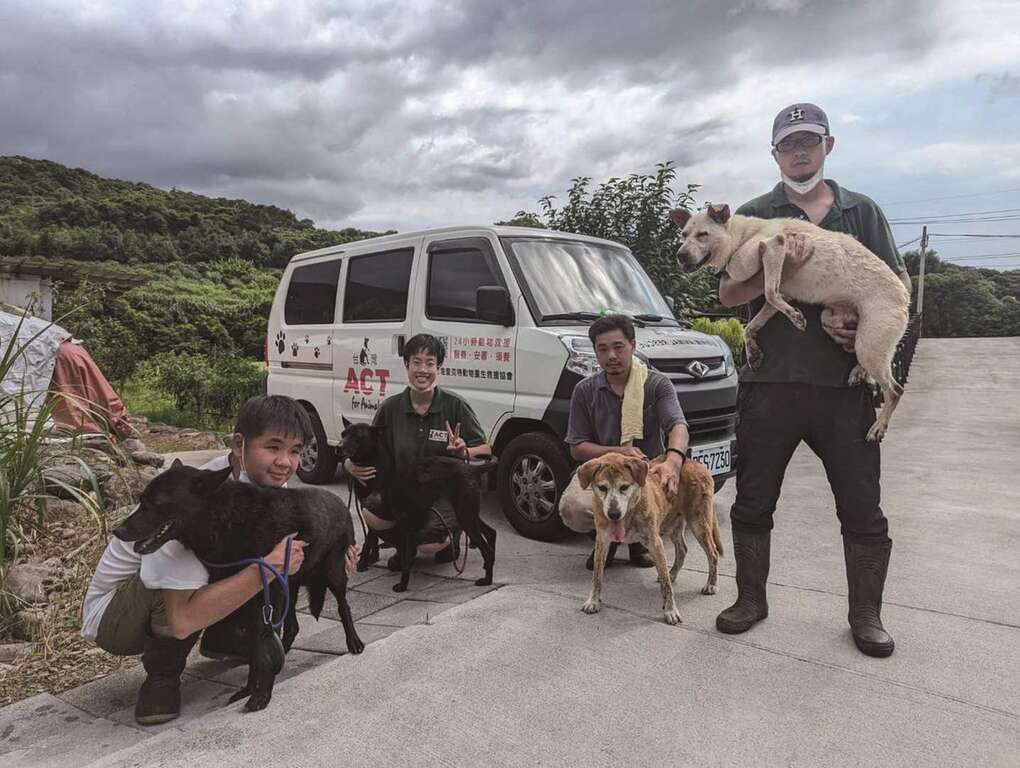 ▲ACT for Animals provides 24-hour emergency rescue, medical care, and rehoming services for stray animals.
▲ACT for Animals provides 24-hour emergency rescue, medical care, and rehoming services for stray animals.
Hsu has always had a deep love for animals, and about 10 years ago answered an employment ad for animal care staff placed by an NGO McCormack was previously involved with. "In fact, one of my dreams as a kid was to build a dog park for stray animals," says Hsu. At the time, Hsu was employed by China Airlines as ground staff and felt little passion for what she was doing. And so, she jumped at the chance to become involved in more meaningful work.
Citizens' Attitudes Change Toward Animal
A few decades ago, says Hsu, strays in Taiwan were commson. People did not understand the responsibilities of pet ownership amid limited space in residential buildings. This was compounded by "northern drifters" who moved to Taipei for work or study but faced a rental market unfriendly to pet owners.
However, over the past 20 years, the situation has greatly improved, Hsu says. "I have to say I am proud of our government at both the national and local levels because the changes have been drastic," says Hsu, "You see few if any strays in Taipei, for example, except perhaps a few in the suburbs." Much new green space has been created, the Animal Protection Act (動物保護法) has been passed, and the Taipei City Animal Protection Office (台北市動物保護處) has been established. In addition, government and NGOs have engaged in animal-welfare education, leading to the creation of numerous shelters. Hsu goes on to say, "We envision Taiwan becoming a leader in Asia for humane treatment of all animals."
The Taipei City Animal Protection Office provides various services, including adoption and rehoming of unwanted animals, as well as managing a large animal shelter. They receive around 10,000 reports annually, resulting in the rescue of about 1,300 dogs and cats, as well as 4,000 other types of animals. Those requiring medical intervention are sent to one of 24 partner facilities for further treatment.
In late 2022, the city announced a new 24-hour hotline (1959) for reporting animals in need of rescue and inquiries related to animal protection. This year, they introduced an animal rescue notification system on the city government's official LINE account, allowing people to upload videos, images, and information about wild animals in need of rescue.
The city has also opened approximately 20 dedicated dog parks, with each of the 12 city administrative districts offering at least one. They have actively expanded pet park facilities in recent years, and have developed plans to renovate their shelter, all with the goal of providing better living space for animals. Additionally, this year, they established an "Animal Protection Classroom" course, requiring individuals to complete an hour-long class before committing to adopting an animal.
Taipei's Current Ecology Compared to Overseas
Unlike many animal rescue and rehabilitation groups overseas, ACT for Animals does not handle international adoptions, "Because they are so hard to trace, and we fear animals then being abandoned overseas and ending up in shelters again," says Hsu. "Most of our adoptions currently are by foreigners living in Taiwan, who will then take the animals with them when they leave Taiwan, " she goes on. In the past, Taiwan citizens were not keen on adopting rescued strays, especially disfigured animals, but attitudes have slowly been changing, with more understanding of and empathy for these animals' plight.
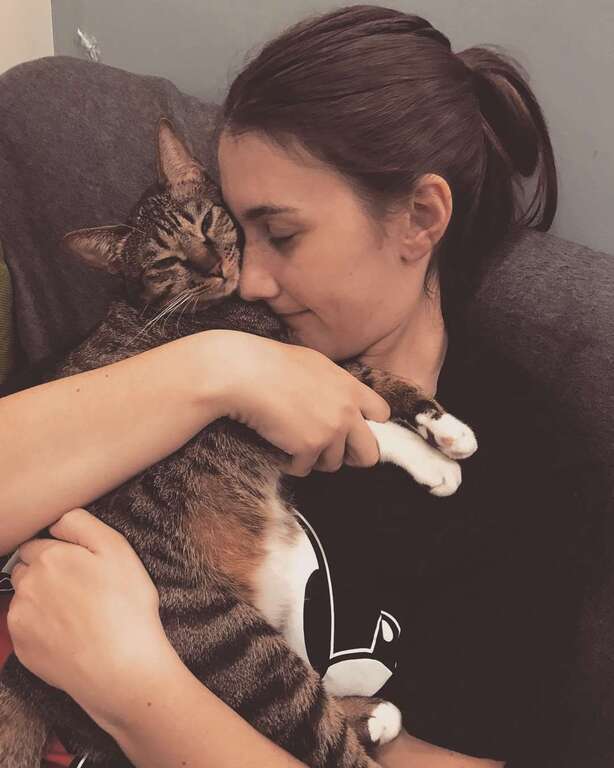 ▲Mocha, rescued three years ago, was abandoned by the original adopting family due to difficulty adjusting to a new environment. It wasn't until Mocha met Megan, from the UK, who provided warm care, that Mocha finally became domesticated. Megan is also soon taking Mocha back to the UK.
▲Mocha, rescued three years ago, was abandoned by the original adopting family due to difficulty adjusting to a new environment. It wasn't until Mocha met Megan, from the UK, who provided warm care, that Mocha finally became domesticated. Megan is also soon taking Mocha back to the UK.
Due to the zero-culling policy, both public and non-public shelters are overwhelmed, and their resources are stretched to the breaking point. Because of a lack of space, Hsu states, some shelters are so cramped that they mostly keep animals in cages. ACT for Animals seeks to emulate the best of international practices seen in Europe, North America, Japan, and elsewhere, by "Running sanctuaries rather than shelters," Hsu says, "more natural places built like outdoor gardens with large land areas and a lot of grass, with no dogs in cages or living inside, spending their time naturally outside." It currently runs two dog sanctuaries and one "cat house," which they also call a "cat cradle," with the cats living inside but getting to spend time outside as well.
"My opinion is that Taiwan is not ready to be a no-kill country unless the government works with NGOs to handle the sheer amount of animals. Groups like us have the determination to build and run very large sanctuaries. The government can transfer animals that cannot be adopted or are unlikely so to our sanctuaries, and help us build these expansive, humane sanctuary facilities, while government shelters and resources specifically focus on 'easier' cases and function as adoption centers, generating more adoptions because the more aggressive, 'unappealing' animals that normally keep people away from shelters will be out of sight."
Most Memorable and Touching Rescue Stories
ACT for Animals is best known for its remarkable rescue of animals caught in illegal traps and snares, as in the numerous compelling videos on their website. The primary target of illegal trapping is wild boars. "One boar brings in at least NT$30,000," says Hsu. "To have these hunters prosecuted and put in jail, you must catch them red-handed in photos/video. This seems impossible — but we've done it!" She says co-founder McCormack, extremely determined, analyzes patterns where they are rescuing more maimed animals and identifies pathways trappers use — seeing where they've cut away branches, etc., creating settings with a more "unnatural" look. Motion sensor cameras are then set up.
"We cooperate with government offices by reporting people setting traps, and also cooperate when there are overlapping reports of strays and both the government and ACT for Animals are attempting rescues," says Hsu. "When reporting illegal trapping we must also identify the individual's car or scooter plates so the government can track him down." This can be dangerous — on one occasion McCormack and another volunteer came face to face with unhappy trappers when in the jungle checking cameras. Many of them simply cannot understand why we are "giving them trouble," Hsu adds, and "of course by definition all hunters are armed." ACT for Animals also reaches out to licensed hunters to encourage them to use more humane devices, such as boxes, and to let any animals mistakenly caught go free.
Dreams for the Future
"Right now ACT for Animals' dog sanctuaries are in the process of moving," Hsu says, as the NGO is maneuvering through the legal licensing procedure. "We're working with the government and trying to rent government land — flat, with reasonable rent — isolated from heavily populated areas, so we don't bother the neighbors. We'll also then be able to take in dogs and cats from the heavily overcrowded public shelters."
She wants to build sanctuaries that are optimal for those dogs that cannot be adopted — "Aggressive, wild, crippled, disabled, and so on; natural places where they can happily live out their lives." As well, coordinating with the government, ACT for Animals hopes to build adoption centers right in Taipei and other cities that are "Not too close to people but are also not too far away." Each would hold 20 to 30 "easy" dogs for people to come view, encouraging adoption. With this type of setting, adoptions will hopefully go up, thus avoiding facility overloading and freeing resources to enable more rescues and rehabilitations.
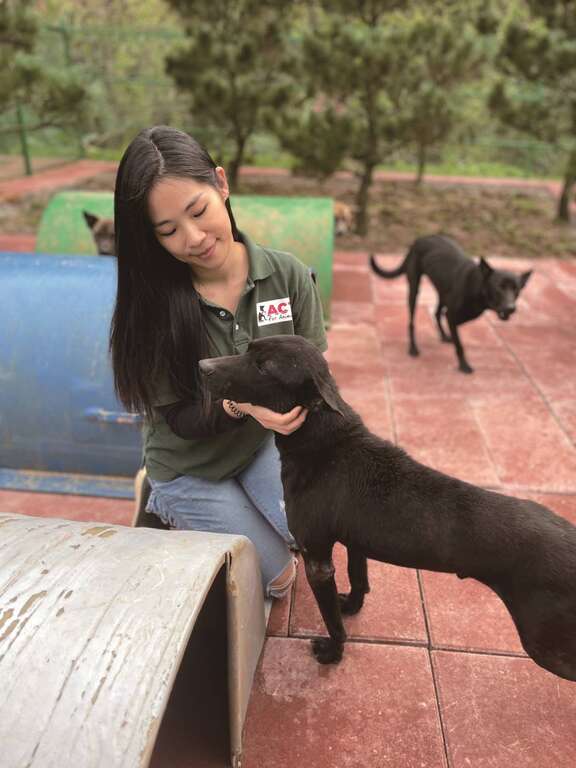 ▲Hsu hopes to build more spacious and comfortable sanctuaries in the future to care for animals.
▲Hsu hopes to build more spacious and comfortable sanctuaries in the future to care for animals.
"This type of endeavor has never been tried before," Hsu says, "but I'm determined to forge forward, and coordination will be necessary with the Department of Agriculture, animal protection offices, units in control of government property, and various other concerned public bodies." Hsu remains optimistic about the future of public awareness and rescue/rehabilitation work, saying, "I am sure that, working in concert, we can do it!"
ACT for Animals Sets New Standards for Animal Rehabilitation
Author Rick Charette
Photographer ACT for Animals
 ▲ACT for Animals founder Judy Hsu and co-founder Sean McCormack have long been dedicated to helping stray animals in Taiwan.
▲ACT for Animals founder Judy Hsu and co-founder Sean McCormack have long been dedicated to helping stray animals in Taiwan.Stray animals are an ongoing concern in Taiwan. Over the past few decades, pets have become beloved in Taiwanese society, with a surge in adoptions during the COVID-19 pandemic. Unfortunately, this has led to an increase in abandonments, necessitating more rehabilitation efforts.
In 2017 a ban on euthanizing impounded animals took effect in Taiwan. As a result, pressure has steadily increased on resource-strapped public animal shelters, and numerous organizations have stepped in to help in rescue efforts. Among the most prominent names is ACT for Animals (台灣愛克特動物重生救援協會), founded in 2019 by a cross-culture couple, Judy Hsu (Taiwan) and Sean McCormack (UK). ACT stands for"Animal Care Trust." TAIPEI sat down with Hsu, the Executive Director, to learn more about the NGO's rescue activities, the homeless animal situation in Taipei/Taiwan, how animal care practices in Taipei differ from other places worldwide, and her hopes for the future.
What ACT for Animals Does Over Time
"We provide 24-hour emergency response and urgent veterinary attention for stricken stray and wild animals all over Taiwan, but especially in the north," says Hsu, "giving them the best chance possible of having their lives transformed. We focus primarily on rescue, rehabilitating, sheltering, and rehoming, but also in bringing those who deliberately harm animals to justice."
The NGO rescues about 100 dogs and 60 cats annually. Most are seriously injured, especially those who have fallen victim to illegal boar traps and other types of snares. It currently has about 300 animals under care in its three sanctuaries.
 ▲ACT for Animals provides 24-hour emergency rescue, medical care, and rehoming services for stray animals.
▲ACT for Animals provides 24-hour emergency rescue, medical care, and rehoming services for stray animals.Hsu has always had a deep love for animals, and about 10 years ago answered an employment ad for animal care staff placed by an NGO McCormack was previously involved with. "In fact, one of my dreams as a kid was to build a dog park for stray animals," says Hsu. At the time, Hsu was employed by China Airlines as ground staff and felt little passion for what she was doing. And so, she jumped at the chance to become involved in more meaningful work.
Citizens' Attitudes Change Toward Animal
A few decades ago, says Hsu, strays in Taiwan were commson. People did not understand the responsibilities of pet ownership amid limited space in residential buildings. This was compounded by "northern drifters" who moved to Taipei for work or study but faced a rental market unfriendly to pet owners.
However, over the past 20 years, the situation has greatly improved, Hsu says. "I have to say I am proud of our government at both the national and local levels because the changes have been drastic," says Hsu, "You see few if any strays in Taipei, for example, except perhaps a few in the suburbs." Much new green space has been created, the Animal Protection Act (動物保護法) has been passed, and the Taipei City Animal Protection Office (台北市動物保護處) has been established. In addition, government and NGOs have engaged in animal-welfare education, leading to the creation of numerous shelters. Hsu goes on to say, "We envision Taiwan becoming a leader in Asia for humane treatment of all animals."
The Taipei City Animal Protection Office provides various services, including adoption and rehoming of unwanted animals, as well as managing a large animal shelter. They receive around 10,000 reports annually, resulting in the rescue of about 1,300 dogs and cats, as well as 4,000 other types of animals. Those requiring medical intervention are sent to one of 24 partner facilities for further treatment.
In late 2022, the city announced a new 24-hour hotline (1959) for reporting animals in need of rescue and inquiries related to animal protection. This year, they introduced an animal rescue notification system on the city government's official LINE account, allowing people to upload videos, images, and information about wild animals in need of rescue.
The city has also opened approximately 20 dedicated dog parks, with each of the 12 city administrative districts offering at least one. They have actively expanded pet park facilities in recent years, and have developed plans to renovate their shelter, all with the goal of providing better living space for animals. Additionally, this year, they established an "Animal Protection Classroom" course, requiring individuals to complete an hour-long class before committing to adopting an animal.
Taipei's Current Ecology Compared to Overseas
Unlike many animal rescue and rehabilitation groups overseas, ACT for Animals does not handle international adoptions, "Because they are so hard to trace, and we fear animals then being abandoned overseas and ending up in shelters again," says Hsu. "Most of our adoptions currently are by foreigners living in Taiwan, who will then take the animals with them when they leave Taiwan, " she goes on. In the past, Taiwan citizens were not keen on adopting rescued strays, especially disfigured animals, but attitudes have slowly been changing, with more understanding of and empathy for these animals' plight.
 ▲Mocha, rescued three years ago, was abandoned by the original adopting family due to difficulty adjusting to a new environment. It wasn't until Mocha met Megan, from the UK, who provided warm care, that Mocha finally became domesticated. Megan is also soon taking Mocha back to the UK.
▲Mocha, rescued three years ago, was abandoned by the original adopting family due to difficulty adjusting to a new environment. It wasn't until Mocha met Megan, from the UK, who provided warm care, that Mocha finally became domesticated. Megan is also soon taking Mocha back to the UK.Due to the zero-culling policy, both public and non-public shelters are overwhelmed, and their resources are stretched to the breaking point. Because of a lack of space, Hsu states, some shelters are so cramped that they mostly keep animals in cages. ACT for Animals seeks to emulate the best of international practices seen in Europe, North America, Japan, and elsewhere, by "Running sanctuaries rather than shelters," Hsu says, "more natural places built like outdoor gardens with large land areas and a lot of grass, with no dogs in cages or living inside, spending their time naturally outside." It currently runs two dog sanctuaries and one "cat house," which they also call a "cat cradle," with the cats living inside but getting to spend time outside as well.
"My opinion is that Taiwan is not ready to be a no-kill country unless the government works with NGOs to handle the sheer amount of animals. Groups like us have the determination to build and run very large sanctuaries. The government can transfer animals that cannot be adopted or are unlikely so to our sanctuaries, and help us build these expansive, humane sanctuary facilities, while government shelters and resources specifically focus on 'easier' cases and function as adoption centers, generating more adoptions because the more aggressive, 'unappealing' animals that normally keep people away from shelters will be out of sight."
Most Memorable and Touching Rescue Stories
ACT for Animals is best known for its remarkable rescue of animals caught in illegal traps and snares, as in the numerous compelling videos on their website. The primary target of illegal trapping is wild boars. "One boar brings in at least NT$30,000," says Hsu. "To have these hunters prosecuted and put in jail, you must catch them red-handed in photos/video. This seems impossible — but we've done it!" She says co-founder McCormack, extremely determined, analyzes patterns where they are rescuing more maimed animals and identifies pathways trappers use — seeing where they've cut away branches, etc., creating settings with a more "unnatural" look. Motion sensor cameras are then set up.
"We cooperate with government offices by reporting people setting traps, and also cooperate when there are overlapping reports of strays and both the government and ACT for Animals are attempting rescues," says Hsu. "When reporting illegal trapping we must also identify the individual's car or scooter plates so the government can track him down." This can be dangerous — on one occasion McCormack and another volunteer came face to face with unhappy trappers when in the jungle checking cameras. Many of them simply cannot understand why we are "giving them trouble," Hsu adds, and "of course by definition all hunters are armed." ACT for Animals also reaches out to licensed hunters to encourage them to use more humane devices, such as boxes, and to let any animals mistakenly caught go free.
Dreams for the Future
"Right now ACT for Animals' dog sanctuaries are in the process of moving," Hsu says, as the NGO is maneuvering through the legal licensing procedure. "We're working with the government and trying to rent government land — flat, with reasonable rent — isolated from heavily populated areas, so we don't bother the neighbors. We'll also then be able to take in dogs and cats from the heavily overcrowded public shelters."
She wants to build sanctuaries that are optimal for those dogs that cannot be adopted — "Aggressive, wild, crippled, disabled, and so on; natural places where they can happily live out their lives." As well, coordinating with the government, ACT for Animals hopes to build adoption centers right in Taipei and other cities that are "Not too close to people but are also not too far away." Each would hold 20 to 30 "easy" dogs for people to come view, encouraging adoption. With this type of setting, adoptions will hopefully go up, thus avoiding facility overloading and freeing resources to enable more rescues and rehabilitations.
 ▲Hsu hopes to build more spacious and comfortable sanctuaries in the future to care for animals.
▲Hsu hopes to build more spacious and comfortable sanctuaries in the future to care for animals. "This type of endeavor has never been tried before," Hsu says, "but I'm determined to forge forward, and coordination will be necessary with the Department of Agriculture, animal protection offices, units in control of government property, and various other concerned public bodies." Hsu remains optimistic about the future of public awareness and rescue/rehabilitation work, saying, "I am sure that, working in concert, we can do it!"
Gallery
:::
Popular articles
 TAIPEI Quarterly 2023 Winter Vol.34
TAIPEI Quarterly 2023 Winter Vol.34 Ximending: A Shopper's Heaven with a Dash of Tradition and Trendiness (TAIPEI Quarterly 2023 Winter Vol.34)
Ximending: A Shopper's Heaven with a Dash of Tradition and Trendiness (TAIPEI Quarterly 2023 Winter Vol.34) Exploring Taipei's Vibrant Indoor Markets: A Flavorful Journey through History and Culture (TAIPEI Quarterly 2023 Winter Vol.34)
Exploring Taipei's Vibrant Indoor Markets: A Flavorful Journey through History and Culture (TAIPEI Quarterly 2023 Winter Vol.34) Soak in History: A Winter Journey to Taiwan's Timeless Hot Springs (TAIPEI Quarterly 2023 Winter Vol.34)
Soak in History: A Winter Journey to Taiwan's Timeless Hot Springs (TAIPEI Quarterly 2023 Winter Vol.34) The Art of Wealth Seeking: Temples and Culture in Taipei (TAIPEI Quarterly 2023 Winter Vol.34)
The Art of Wealth Seeking: Temples and Culture in Taipei (TAIPEI Quarterly 2023 Winter Vol.34) Bookstores Redefined: Embracing Global Connections and Creativity (TAIPEI Quarterly 2023 Winter Vol.34)
Bookstores Redefined: Embracing Global Connections and Creativity (TAIPEI Quarterly 2023 Winter Vol.34)
 ACT for Animals Sets New Standards for Animal Rehabilitation (TAIPEI Quarterly 2023 Winter Vol.34)
ACT for Animals Sets New Standards for Animal Rehabilitation (TAIPEI Quarterly 2023 Winter Vol.34)